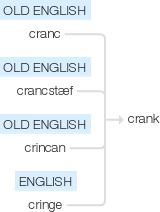Crank
Old English cranc (recorded in crancstæf, denoting a weaver's implement), related to crincan (see cringe).
wiktionary
From Middle English cronk, cranke, from Old English cranc, from Proto-West Germanic *krank, from Proto-Germanic *krangaz, *krankaz(“bent; weak”).
Cognate with German krank(“sick”), Dutch krank(“sick”).
etymonline
crank (n.)
"bent or vertical handle for turning a revolving axis," Old English *cranc, implied in crancstæf "a weaver's instrument," crencestre "female weaver, spinster," which is related to crincan "to bend, yield," from Proto-Germanic *krank- "bend, curl up" (see cringe).
English retains the literal sense of the ancient word ("something bent or crooked"), while in other Germanic languages it tends to have only a figurative sense (German and Dutch krank "sick," formerly "weak, small"). The Continental definition entered into English crank via slang counterfeit crank "one who shams sickness to get charity" (1560s). OED notes that "the 16th c. vagabonds' cant contains words taken directly from Continental languages." It apparently lingered in the north (the 1825 supplement to Jamieson's Scottish dictionary has crank "infirm, weak, etc.") and might have influenced the development of the English word.
Meaning "twist or turn of speech, grotesquery in words" is from 1590s; that of "absurd or unreasonable act" (perhaps caused by "twisted judgment") is from 1848. The sense of "eccentric person," especially one who is irrationally fixated, is first recorded 1833; this sometimes is said to be from the crank of a barrel organ, which makes it play the same tune over and over; but more likely it is a back-formation from cranky (q.v.) and thus from the notion of one having a mental "twist."
The person who adopts "any presentiment, any extravagance as most in nature," is not commonly called a Transcendentalist, but is known colloquially as a "crank." [Oliver W. Holmes, "Ralph Waldo Emerson"]
There also was a crank (adj.) in Middle English meaning "lively, brisk, merry," but it is of uncertain origin and connection. Cranky for "merry, lively" lingered into 19c. in northern England dialects and American English. Meaning "methamphetamine" attested by 1989, from the verb.
crank (v.)
1590s, "to zig-zag, run in a winding course," from crank (n.) "a bend, a crook," hence "a winding," for which see crank (n.). From 1793 as "to bend into a crank shape;" 1834 as "attach a crank to;" meaning "to turn a crank" is first attested 1908, with reference to automobile engines. Related: Cranked; cranking.
